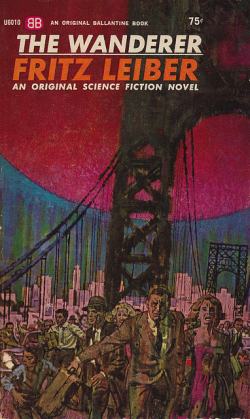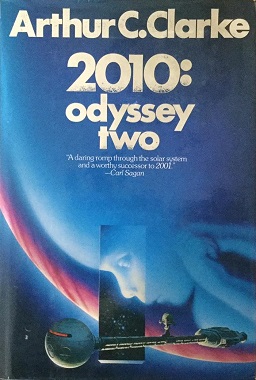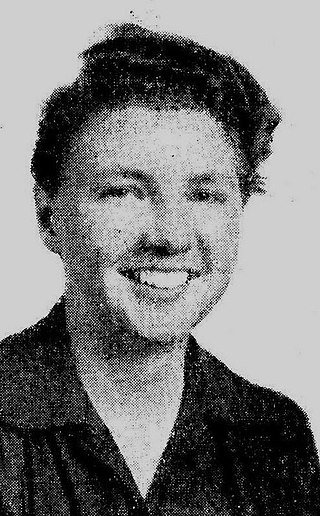
The Wanderer is a science fiction novel by American writer Fritz Leiber, published as a paperback original by Ballantine Books in 1964. It won the 1965 Hugo Award for Best Novel.

2010: Odyssey Two is a 1982 science fiction novel by British writer Arthur C. Clarke. It is the sequel to his 1968 novel 2001: A Space Odyssey, though Clarke changed some elements of the story to align with the film version of 2001.

Leigh Douglass Brackett was an American science fiction writer known as "the Queen of Space Opera." She wrote the screenplays for The Big Sleep (1946), Rio Bravo (1959), and The Long Goodbye (1973). She worked on an early draft of The Empire Strikes Back (1980), elements of which remained in the film; she died before it went into production. In 1956, her book The Long Tomorrow made her the first woman ever shortlisted for the Hugo Award for Best Novel, and, along with C. L. Moore, one of the first two women ever nominated for a Hugo Award.

The Rolling Stones is a 1952 science fiction novel by American writer Robert A. Heinlein.

Science fiction is a film genre that uses speculative, fictional science-based depictions of phenomena that are not fully accepted by mainstream science, such as extraterrestrial lifeforms, spacecraft, robots, cyborgs, mutants, interstellar travel, time travel, or other technologies. Science fiction films have often been used to focus on political or social issues, and to explore philosophical issues like the human condition.

David Gerrold is an American science fiction screenwriter and novelist. He wrote the script for the original Star Trek episode "The Trouble with Tribbles", created the Sleestak race on the TV series Land of the Lost, and wrote the novelette "The Martian Child", which won both Hugo and Nebula Awards, and was adapted into a 2007 film starring John Cusack.

When HARLIE Was One is a 1972 science fiction novel by American writer David Gerrold. It was nominated for the Nebula Award for Best Novel in 1972 and the Hugo Award for Best Novel in 1973. The novel, a "fix-up" of previously published short stories, was published as an original paperback by Ballantine Books in 1972, with an accompanying Science Fiction Book Club release. A revised version, subtitled "Release 2.0", was published in 1988 by Bantam Books.

"The Trouble with Tribbles" is the fifteenth episode of the second season of the American science fiction television series Star Trek. Written by David Gerrold and directed by Joseph Pevney, it was first broadcast on December 29, 1967. In this comic episode, the starship Enterprise visits a space station that soon becomes overwhelmed by rapidly reproducing small furry creatures called "tribbles."
"More Tribbles, More Troubles" is the fifth episode of the first season of the animated American science fiction television series Star Trek. It first aired in the NBC Saturday morning lineup on October 6, 1973, and was written by David Gerrold as a sequel to his Original Series episode "The Trouble with Tribbles". It features actor Stanley Adams reprising his role of trader Cyrano Jones, and the return of the fuzzy, rapidly reproducing creatures called tribbles.
"I, Mudd" is the eighth episode of the second season of the American science fiction television series Star Trek. Written by Stephen Kandel and directed by Marc Daniels, it was first broadcast on November 3, 1967.

The Sands of Mars is a science fiction novel by English writer Arthur C. Clarke. While he was already popular as a short story writer and as a magazine contributor, The Sands of Mars was also a prelude to Clarke's becoming one of the world's foremost writers of science fiction novels. The story was published in 1951, before humans had achieved space flight. It is set principally on the planet Mars, which has been settled by humans and is used essentially as a research establishment. The story setting is that Mars has been surveyed but not fully explored on the ground. The Sands of Mars was Clarke's first published novel.

The War Against the Chtorr is a series of science fiction novels by American writer David Gerrold. The Chtorr series was originally planned as a trilogy, but as the story became more intricate, Gerrold realized that three books would not be enough for him to tell the entire story. For a time, he was uncertain how many books there would be in the end but plans on seven. As of 2022, four books have been completed. As of 2017, a fifth and sixth were in the works, 24 years after the publication of the fourth book.
"The Martian Child" is a novelette by American writer David Gerrold, originally published in Fantasy & Science Fiction. It won the 1995 Hugo Award for Best Novelette, Locus Award and HOMer Award and the 1994 Nebula Award for Best Novelette, and was nominated for the Theodore Sturgeon award for best short fiction. The novelette was expanded into a novel and made into an eponymous film.

Vulcan! (1978) is a science fiction novel by American writer Kathleen Sky, a tie-in of Star Trek: The Original Series. The book is an adaptation of an unproduced spec script by Sky.
"Bem" is the second episode of the second season of the American animated science fiction television series Star Trek, the 18th episode overall. It first aired in the NBC Saturday morning lineup on 14 September 1974, and was written by David Gerrold, who wrote the earlier episode "More Tribbles, More Troubles" and worked on several Original Series episodes.

Jupiter, the largest planet in the Solar System, has appeared in works of fiction across several centuries. The way the planet has been depicted has evolved as more has become known about its composition; it was initially portrayed as being entirely solid, later as having a high-pressure atmosphere with a solid surface underneath, and finally as being entirely gaseous. It was a popular setting during the pulp era of science fiction. Life on the planet has variously been depicted as identical to humans, larger versions of humans, and non-human. Non-human life on Jupiter has been portrayed as primitive in some works and more advanced than humans in others.

Saturn has made appearances in fiction since the 1752 novel Micromégas by Voltaire. In the earliest depictions, it was portrayed as having a solid surface rather than its actual gaseous composition. In many of these works, the planet is inhabited by aliens that are usually portrayed as being more advanced than humans. In modern science fiction, the Saturnian atmosphere sometimes hosts floating settlements. The planet is occasionally visited by humans and its rings are sometimes mined for resources.

The Cherryh Odyssey is a 2004 collection of essays by various academics, critics and authors about American Hugo Award-winning science fiction and fantasy author, C. J. Cherryh. It was edited by author and academic, Edward Carmien, and was published by Borgo Press, an imprint of Wildside Press as part of its Author Study series. Locus Magazine put the book on its "2004 Recommended Reading List", and Carmien received a nomination for the 2005 Locus Award for Best Non-fiction book for The Cherryh Odyssey.
The Dingilliad is a series of science fiction novels by American writer David Gerrold. The trilogy is published under the title The Far Side of the Sky. It is also known as The Starsiders Trilogy, although The Dingilliad is the name given by the author. The latter refers to Dingillian, the surname of the family of main characters, and is a pun on the Iliad. The books are often compared to Robert A. Heinlein's juvenile novels.












